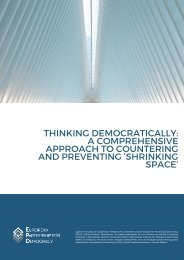Repression and resilience: Diagnosing closing space mid-pandemic
Create successful ePaper yourself
Turn your PDF publications into a flip-book with our unique Google optimized e-Paper software.
REPRESSION AND RESILIENCE: DIAGNOSING CLOSING SPACE MID-PANDEMIC<br />
41<br />
for the government to start unilaterally reviewing <strong>and</strong> rewriting the content of the agreements, using the limited<br />
international scrutiny resulting from the p<strong>and</strong>emic. In parallel, the p<strong>and</strong>emic provided an opening for illegal groups like<br />
FARC to increase their activities (including kidnappings, attacks <strong>and</strong> assassinations).<br />
Civic <strong>space</strong> was severely restricted over the course of the p<strong>and</strong>emic, with a particularly worrying increase in human<br />
rights violations. By the end of May 2020, human rights organisations reported at least 100 killings of social activists<br />
since the beginning of the year, 27 of which took place during the m<strong>and</strong>atory lockdown. Death squads exploited the<br />
chaos of the crisis to kill activists, with the government doing little to protect them. Further human rights abuses greatly<br />
affected women, LGBTQI people, indigenous people <strong>and</strong> the prison population.<br />
The Amazon community was particularly impacted, with disproportionately high infection rates <strong>and</strong> inadequate<br />
healthcare affecting indigenous communities at risk of physical <strong>and</strong> cultural extinction. On top of this, the indigenous<br />
compensation programme was delayed, <strong>and</strong> a lack of connectivity restricted children’s access to education even<br />
further. Inmates meanwhile stayed in overcrowded facilities with inadequate sanitary measures. A gendered lockdown<br />
in some cities exposed women to overcrowded shops <strong>and</strong> led to violence against people with diverse sexual <strong>and</strong><br />
gender identities.<br />
Freedom of movement <strong>and</strong> association were also greatly restricted, <strong>and</strong> Colombia saw a surge in violence against<br />
women during the lockdown. The economic effects of the crisis were major, with the unemployment rate reaching a<br />
record high of 26.2%. Inequality <strong>and</strong> poor access to drinking water, sanitation, food security <strong>and</strong> adequate housing led<br />
to a particularly dire situation for vulnerable populations.<br />
Democratic <strong>space</strong> was further attacked by a concentration of powers in the executive, who restricted <strong>space</strong> for judiciary<br />
<strong>and</strong> legislative oversight through the state of emergency. The limited oversight of the first month of the p<strong>and</strong>emic was<br />
used to issue 72 decrees, laws, <strong>and</strong> dozens of resolutions <strong>and</strong> administrative acts on economic, tax, civil, labor, <strong>and</strong><br />
criminal matters, among others. While some of these measures related directly to the COVID response, others did not.<br />
Moreover, many decrees were found to be unconstitutional - even during a state of emergency. The sheer number of<br />
decrees prevented Congress <strong>and</strong> the Constitutional Court from exercising oversight, which was further complicated by<br />
their slow transition to online working methods.<br />
While the Courts found themselves unable to catch up to all the legislation, Congress was similarly hampered in its<br />
oversight over executive decisions. Furthermore, virtual congressional sessions proved to tip the balance in favour of<br />
the government, as online platforms created new opportunities for silencing opposition - literally by muting participants<br />
<strong>and</strong> disabling the chat. Moreover, the legislative process was far less transparent with online sessions, <strong>and</strong> it took<br />
months for Congress to return to in-person sessions.<br />
Kenya<br />
Before the p<strong>and</strong>emic hit Kenya, the ruling party was already progressively <strong>closing</strong> civic <strong>space</strong> with restrictive laws<br />
<strong>and</strong> operating requirements, <strong>and</strong> occasionally physical attacks on media <strong>and</strong> civil society. Such physical attacks<br />
increased, with excessive <strong>and</strong> unreasonable use of force by law enforcement officers, the inti<strong>mid</strong>ation of journalists<br />
<strong>and</strong> human rights defenders, <strong>and</strong> an increase in detentions of persons violating the curfew. Arbitrary arrests, assaults<br />
<strong>and</strong> harassment against journalists, bloggers, whistle-blowers <strong>and</strong> human rights defenders tripled in the beginning of

















